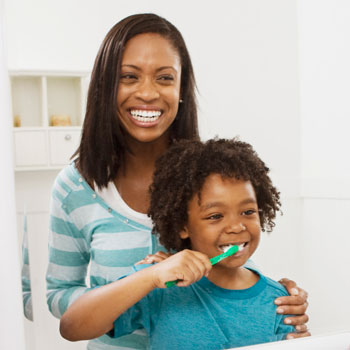Teaching Your Child Healthy Hygiene Habits

Once your child begins walking, he will become more and more independent. Toddlers and preschoolers want to try to do a number of things on their own and parents have a tremendous opportunity to instill good, healthy habits as they teach self-care skills during this stage of development.
Your child will best learn how to care for herself by watching you and her older siblings. Set a good example by taking good care of yourself, keeping yourself well-groomed, and following the same healthy practices you hope to teach your child. Discuss germs and their role in sickness with your child very early on and talk with her about things she can do to prevent germs from making her sick.
As we all know, the best germ deterrent is washing your hands regularly. Teach your little one to wash his hands after playing outside, after he uses the restroom, and before he eats. Also encourage him to wash up if he coughs or sneezes and after he plays with animals or pets. Twenty seconds of rubbing, remembering to get in between fingers, with warm water and a mild soap is usually enough to get rid of any germs.
When children enjoy keeping themselves clean, they are more likely to make good hygiene a lifelong habit. Help your child wash her hands the right way by asking her to sing a short song as she washes. “Happy Birthday”, “Row, Row Your Boat”, or two rounds of the ABC song will last about 20 seconds each, helping your child develop a habit of washing her hands properly.Most toddlers and preschoolers already enjoy splashing around in the tub, but educational bath toys like the Baby Einstein Bath Toy collection can make bath time even more fun. Make a game out of washing to encourage and teach your child to clean himself, as well as learn the names of his body parts. Hand him the soapy wash mitt and let him wash each part as you call out the name, like leg, knee, or shoulder. Make the game more challenging by using right and left as well.
Good oral hygiene habits are equally important and should be encouraged during the toddler years as well. Teach your child to brush her own teeth by brushing your teeth beside her. Show her how to turn the brush to get every side of her teeth clean. Many children want to rush through this part of their routine, so a timer set for two or three minutes may develop better habits. Always be sure to brush behind your child until she is about nine.
Eating a healthy diet, exercising, and getting enough sleep are also key factors in good health and hygiene. Talk to your child about why these things are important and set a good example by eating your own vegetables and making exercise a part of your daily routine. Introduce your child to new foods often and always explain the benefits the food holds.
Encourage him to try at least one bite and continue to serve not so popular dishes as he acquires new tastes. Establish a bedtime routine to ensure that your little one gets enough sleep and encourage at least 90 minutes of physical activity each day.
For more tips on parenting and educational toys, please see our website www.thekidstoystore.com.
Article Source: http://www.parentingarticlelibrary.com
